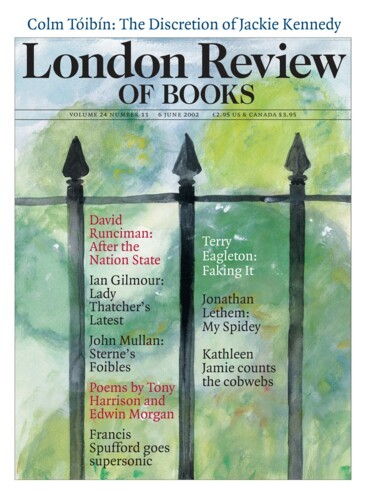We live, so we are frequently told, in information-rich times. At least, those of us who live in information-rich places do. The glut is such that it isn’t possible even to make a fully informed choice of what to take in: the range of possibilities itself needs to have been preselected if we are ever to get beyond reading the menu. (This is why Waterstone’s and other booksellers are able to make publishers pay to have their books displayed prominently enough for people to notice, let alone buy them.) A brain trying to absorb too much too quickly can feel like a slug in a salt barrel. In this supersaturated environment, a low-sodium niche is rapidly expanding: short stuff. Even the doggedly highbrow London Review of Books has made concessions to the demand for brevity – in this corner at least. Thank heavens for New Left Review.
Ever quick off the mark, Machiavelli was long ago alert to the pitfalls of prolixity. The target audience for The Prince were all busy men. Were Machiavelli around now, his book would probably be called ‘The CEO’, princes these days having rather less power and rather more time on their hands than they used to. The heir to the English throne, for example, has recently been enjoying An Englishman in Paris: l’éducation continentale by Michael Sadler (Simon and Schuster, £10). On 14 April Charles wrote Sadler a letter, duly circulated a few weeks later by his publishers (I don’t think it’s a hoax). To make sense of it, it’s useful to know that Sadler’s book opens with a description of a large cheese:
The first chapter certainly did not disappoint and made me laugh out loud! Your descriptive talents are truly epic and I can’t wait to read the rest of the book . . . Meanwhile, I wondered if you might like to try one of my own cheeses – made from Ayrshire organic, unpasteurised milk from the Duchy Home Farm at Highgrove . . . I called it ‘Starvall Royal’ and I have been trying to see if we could produce it commercially through my Duchy Originals Company.
His Royal Highness, it would seem, is wisely making contingency plans in the event of Abolition.
But I digress. The Prince may be short, but it clearly isn’t short enough for today’s cheese magnates. A new edition, turbo-entitled Power, is now available (Profile, £2.99). Weighing in at a mere 46g, and measuring only 15 x 10 x 0.6 cm3, it will slip effortlessly into a breast pocket without disturbing the line of even the most sharply tailored Oswald Boateng suit. The corollary of such compactness is the heaviness of the abridgment: in fact, The Prince has been stripped with such gusto that the remaining bare bones don’t add up to more than a metatarsal or two and half a jawbone – it’s still, just about, identifiable from dental records. There are three other titles in the ‘Illuminations’ series: Love by Vatsyayana, Happiness by Marcus Aurelius and Faith by St Paul. Impulse buyers of the LRB can get them free, I gather, from select WHSmith travel outlets in London, where they should be on prominent display; some of you have no doubt already been Illuminated by the potted Kama Sutra.
For anyone who can’t find the time to get to the theatre, or who can’t make sense of the newly scattered RSC, help is at hand in the form of Shakespeare in a Box (Workman, £25). It comes in two flavours, tragic or comic (King Lear or The Taming of the Shrew), and has everything you need to put on a production in ‘45 minutes or less!’ King Lear’s box contains a Fool’s cap, a plastic retractable dagger, a couple of plastic eyeballs, eleven scripts (ten abridged for performance, one full-length for reference) and a stack of Players’ Cards. These let the actors know their motivation etc. Goneril and Regan are each told to ‘be a venomous bitch’ in their dealings with Gloucester; the Fool, curiously, is instructed to ‘play it as a bad country and western singer’. Everyone also has a list of props: for the most part these consist either of ‘None’ or ‘Dagger (the dagger must be shared, so don’t pick it up until it is your turn to stab someone)’. You have to make your own map.
So what better way to keep the family happy over a long Jubilee bank holiday weekend, once the excitement of England v. Sweden is over, than with a quick bout of bardiness? Perhaps the Royal Family will be tempted to indulge in a bit of avant-garde transvestite theatre. The Queen, obviously, would play the King; and Edward, who after all has a theatrical background, could make an excellent Cordelia. Sven-Göran Eriksson should direct; and if Tony Blair is too busy to play the Fool, perhaps Martin Amis, who has been tentatively sticking up for the Royals in the New Yorker, might oblige. And – who knows? – maybe the Prince of Wales will even be tempted to look into manufacturing and marketing his own organic vile jelly.
Send Letters To:
The Editor
London Review of Books,
28 Little Russell Street
London, WC1A 2HN
letters@lrb.co.uk
Please include name, address, and a telephone number.

